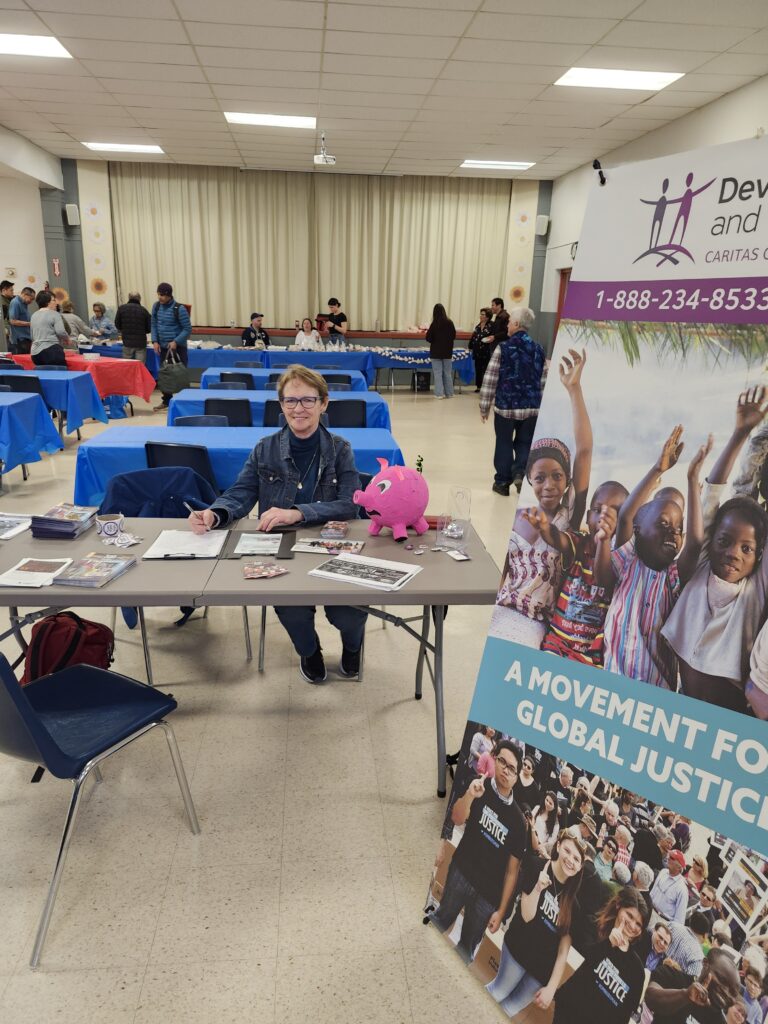Boost your petition drive: best practices from Development and Peace ― Caritas Canada animators

As part of the Jubilee: Turn Debt into Hope campaign, KAIROS and its partners are working to collect as many petition signatures as possible ahead of the G7 Summit in Calgary this June. At this time of writing, Development and Peace ― Caritas Canada (DPCC) has collected more than 8,750 signatures! We spoke with Randy Haluza-DeLay, DPCC’s animator for central Ontario, to learn how his organization is engaging churches, schools, and volunteers in this effort. Here‘s what he had to say, based on his own experience and comments from other animators.
KAIROS: What methods does DPCC use to collect petition signatures?
Randy: We really lean into our existing networks—parishes, schools, and volunteers. One of the key strategies is getting official support from bishops, which encourages priests to get on board. That support makes it easier to promote the campaign during services.
We also run workshops, both in parishes and schools. Our school programs can be really effective—students and teachers often find creative ways to gather more signatures. For example, one class of 38 students managed to collect over 200 signatures!
Another powerful approach is short talks during Mass. DPCC has written a few versions that are available on its website. These are as little as three-minute messages that volunteers can personalize, followed by petition-signing at tables near church exits. The most effective method? Volunteers standing at the exits with clipboards, directly asking people to sign.
KAIROS: Why is support from church leadership so important?
Randy: In a lot of churches, especially in hierarchical denominations like the Catholic Church, a campaign is much more likely to succeed when a bishop or pastor gives it their blessing. If a bishop writes a letter of support, that often signals to priests that it‘s okay—even important—to promote the campaign. Once the leadership is on board, the doors really open. Priests are more likely to allow short talks, bulletin announcements, or space for petition tables, which makes everything easier.
This applies beyond the Catholic Church, too. If you’re part of another denomination, consider asking your church leaders—at the local, regional, or national level—to speak out or offer support. If the pastor even mentions it from the pulpit, people in the pews hear it even more clearly.
KAIROS: What kinds of resources are available to support this work?
Randy: We have a whole range of tools on our website—devp.org/debt—including sample bulletin announcements, prayers, and campaign-themed Stations of the Cross. We also suggest symbolic items, like a walking stick or a clipboard with a petition, to visually connect the campaign to themes.
All of these can be adapted by any denomination. The tools aren’t specifically Catholic—they’re for everyone committed to global justice.

KAIROS: What are some challenges you’ve faced, and how do you overcome them?
Randy: A big challenge is making sure people understand the issue. Debt justice isn’t simple, and three minutes at the end of a service isn’t a lot of time to explain it. People sometimes hesitate to sign if they don’t fully understand the campaign.
To address that, we try to keep our message simple and impactful. For example: “Three out of every eight people on the planet live in countries that spend more on debt payments than on education or healthcare.” That lands with people. We also share stories—like a parishioner from the Philippines speaking about how debt has affected his family back home.
KAIROS: What seems to resonate most with people?
Randy: Personal connections. When people hear about the campaign from someone they know in their church community, they’re more likely to engage. That’s why we encourage volunteers to speak in their own parishes, where they already have relationships.
We also tap into the Christian narrative of Jubilee—debt forgiveness, freeing slaves, and restoring the land. That message connects deeply with people’s values.
KAIROS: Why do these actions matter?
Randy: Signing a petition is a first step. It gives people an easy entry point into a broader justice movement. Once they’ve signed, they might be willing to help collect signatures or even lead a workshop. It’s about building a movement, one step at a time.
And morally? We’re called to be in solidarity with others. If we have privilege, we have a responsibility to act. As Pope Francis said in proclaiming the Year of Jubilee, wealthy nations should cancel debt.
KAIROS: Any last words of advice?
Randy: Keep it simple. Use your own networks—your church, your school, your community. Do a short talk and make the ask right at the beginning: “Please sign this petition.” Then explain why.
Have clipboards ready and ask people directly. That personal ask makes all the difference. And don’t worry if you don’t have a huge team. Even one or two motivated volunteers can gather hundreds of signatures if they’re organized.
Also, consider hosting “train-the-trainer” sessions. They help build confidence and momentum, especially across a large network like KAIROS.
Want to get involved?
Download the petition, resources, and promotional materials.
Every signature counts as we prepare to bring a strong message to G7 leaders in June!
